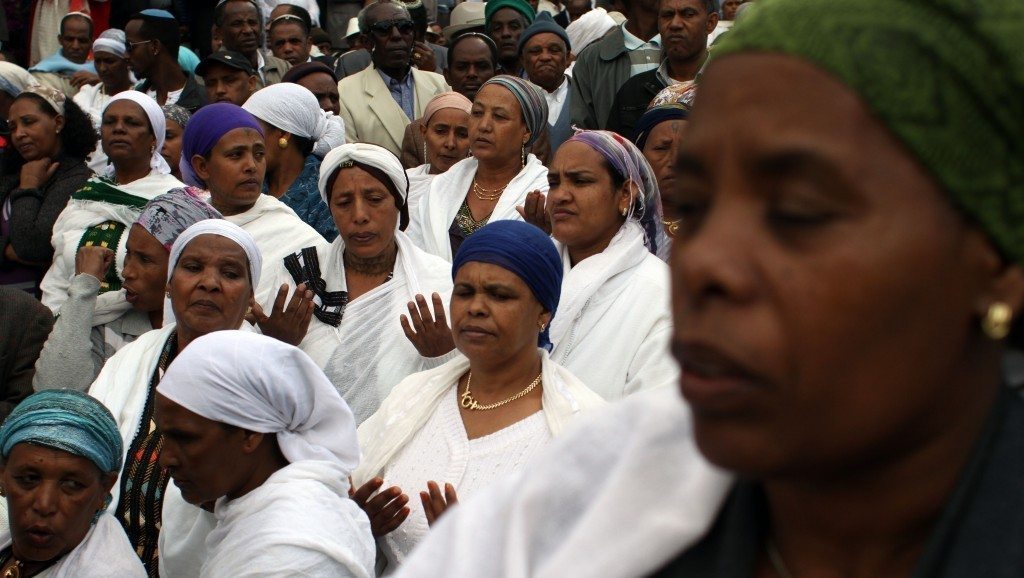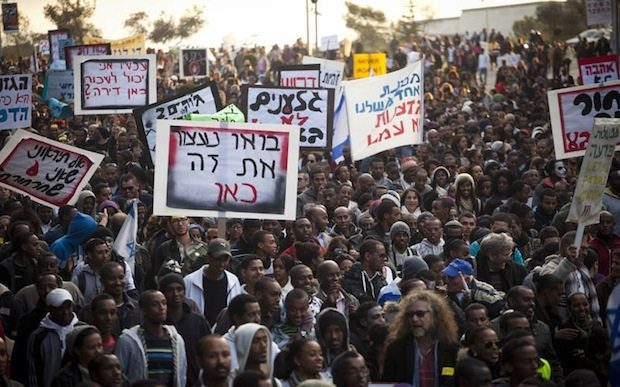Hebrew Israel Slaveries Part 1 | Horrific Israeli discrimination against Ethiopian Jews violate human and religious rights.
The Hidden FALASHAS | BETA ISRAEL of EAST & WEST AFRICA | Hebrew Israel SLAVERIES part 1

Problems even the snow can’t cover.
Despite Israel losing, as it does every year, its collective mind over the fact that white fluffy stuff FALLS FROM THE SKY in the winter, some more consequential matters made it into the newspapers, after coverage of the snowstorm, of course.
The refusal of Magen David Adom employees to accept the blood of Ethiopian MK Penina Tamanu-Shata shocked many Israelis. She was told that “Ethiopians have a special type of blood,” and they wouldn’t be using it.
According to Yedioth Ahronoth, whose sister website Ynet broke the story, MDA said that they were acting in accordance with government guidelines.
“According to the rules of the Health Ministry, we cannot use blood donated by someone born in or who lived more than a year after 1977 in a country in which AIDS is prevalent, and this includes countries in Africa,” Eilat Schneuer, head of MDA’s blood services, said. “We are not racists — the Health Ministry determined, based on epidemiological data, the situations in which blood donations can endanger public health.”
Schneuer also said that Tamanu-Shata was in meetings with the Health Ministry about finding solutions to this issue.
The excuses didn’t exactly suffice for the legislator. In a heartfelt column in Yedioth, Tamanu-Shata shares her, and her community’s, experience with the issue.
“I was 16 years old in 1996,” she writes “when I and those in my community discovered that our blood donations were being destroyed… I was 25 in 2005, when we discovered they were still throwing our blood into the trash… And what has changed? Seven years have passed, but the struggle is not over. Ethiopians born in Israel can give blood, but those born in Ethiopia are still not eligible.
“You must understand: This is not only my personal story. This is the story of an entire community, of tens of thousands of people walking around with a feeling of humiliation, that they are not as good, that their blood is good enough for the army and reserves but not to save lives… It seems that the Health Ministry, which set these discriminatory regulations, has no problem spilling our blood.”
Health Minister Yael German told Haaretz that it is “absurd that in 2013, Ethiopians who came here more than 25 years ago can’t give blood. I am holding meetings with professionals in the Health Ministry and blood banks in order to change and bring to an end this absurdity.”
Maariv reminded readers that it broke the first story in 1996. “MDA claimed in its defense that the reason for the order to destroy the samples was the discovery of malaria, hepatitis, and AIDS among Ethiopians immigrants. Health Ministry officials claimed that close to 40 percent of Ethiopian immigrants carried AIDS.”
Maariv ran another worrying story about the Ethiopian community next to its coverage of the blood donation scandal. An IDF Manpower Branch study found that the percentage of Ethiopians who are accepted into career military service is only half that of all IDF soldiers. In 2012, for example, 16.5% of officers continued on to a career position after their mandatory service, compared to only 7.5% of Ethiopian officers.
“If I was so bad all those years, why did you extend my service until now?!” wrote an female Ethiopian officer who was not given a position after her regular service ended. “And if I did not function properly, why am I serving for such a long time in this unit?”

“And now I am told about the troubling statistics about Ethiopians’ service in the career military,” writes Tamanu-Shata in Maariv, her second column in Thursday’s newspapers. “This is also symptomatic. If we want there to be Ethiopian officers, we need to start from the bottom. We need to help draftees finish their service, solve their financial and social problems… We cannot do separate courses for Ethiopians. We need to grow a generation of Ethiopian officers as an example to others. Otherwise there is no hope.”
But Israel Hayom’s Ran Reznick argues in no uncertain terms that there is simply no basis for blaming the blood refusal on racism. He tells of a friends of his, a businessman, who also cannot give blood in Israel. Why? Because he lived in the UK from 1980 to 1996, when there was a Mad Cow Disease outbreak. But he isn’t claiming discrimination.
“They understand that the ban, set by the Health Ministry, is designed to protect public health,” he writes.
“There is no gentle way to say this, but we can’t ignore the facts. According to the Health Ministry, the three primary populations who carry HIV in the last 30 years, out of Israel’s 6,102 carriers, are those from Africa (2,3710), gays (1,413), and drug addicts (829).”
“It will be impossible to justify,” Reznick continues, “to accept, or forgive incidents in which patients in Israel are infected with diseases because of contaminated blood, when not all preventative measures accepted worldwide for blood donation have been implemented.”
Israeli media were also analyzing another embarrassing episode connected to the African continent.
Haaretz’s Ari Shavit says PM Benjamin Netanyahu’s about-face on attending Nelson Mandela’s memorial service is a metaphor for Israel’s move away from equality and human rights in recent decades.
“For the last quarter century, Mandela was the clearest symbol of the world we want to live in. For the last 25 years, he was a global icon of equality, peace, freedom, and nobility. But in the last quarter century, Israel has turned further and further away from the world want to live in. For the last 25 years, Israel has retreated from its responsibilities to equality, peace, freedom, and nobility. It is not surprising that it has lost the sensitivity needed in order to understand how important Mandela’s funeral is.”
Shavit’s colleague Bradley Burston was even harsher. “The problem isn’t that initially Netanyahu told the South African government he’d be attending. The basic problem also isn’t the suddenness with which the decision was made, without counsel, such that President Peres’s office wasn’t updated to allow it to arrange for Peres to represent Israel instead of Netanyahu.
“The problem was the reason Netanyahu chose to blame his absence on: money… The problem, then, is the message Netanyahu chose to send: My Israel, Israel which so desires international legitimacy and recognition and even demands that it be accepted, doesn’t see Mandela and the South African nation as worthy of the cost of the flight.”
Read more: Problems even the snow can’t cover | The Times of Israel https://www.timesofisrael.com/problems-even-the-snow-cant-cover/#ixzz3RMSjpORC
Follow us: @timesofisrael on Twitter | timesofisrael on Facebook
Source: The Times of Israel



